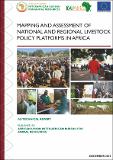| dc.contributor.author | AU-IBAR | |
| dc.contributor.author | Oppong-Otoo, John | |
| dc.contributor.author | Boussini, Hiver | |
| dc.contributor.author | Ossiya, Sarah | |
| dc.contributor.author | Wabacha, James | |
| dc.contributor.author | Niang, Papa Ndary | |
| dc.date.accessioned | 2022-07-07T12:01:06Z | |
| dc.date.available | 2022-07-07T12:01:06Z | |
| dc.date.issued | 2021-12 | |
| dc.identifier.citation | African Union Inter-African Bureau for Animal Resources (2021). Mapping and Assessment of National and Regional Livestock Policy Hubs in Africa. Nairobi, Kenya | en |
| dc.identifier.uri | http://repository.au-ibar.org/handle/123456789/1235 | |
| dc.description.abstract | The purpose of this study was to identify best practices, limitations, and weaknesses of livestock platforms on a national and regional scale in order to propose practical actions to improve their operationalisation. | en |
| dc.description.sponsorship | European Union | en |
| dc.format.extent | 66 pages | en |
| dc.language.iso | en | en |
| dc.publisher | AU-IBAR | en |
| dc.subject | Policy Hubs | en |
| dc.subject | Livestock Development | en |
| dc.subject | Live2Africa | en |
| dc.title | Mapping and Assessment of National and Regional Livestock Policy Platforms in Africa | en |
| dc.type | Technical Report | en |
